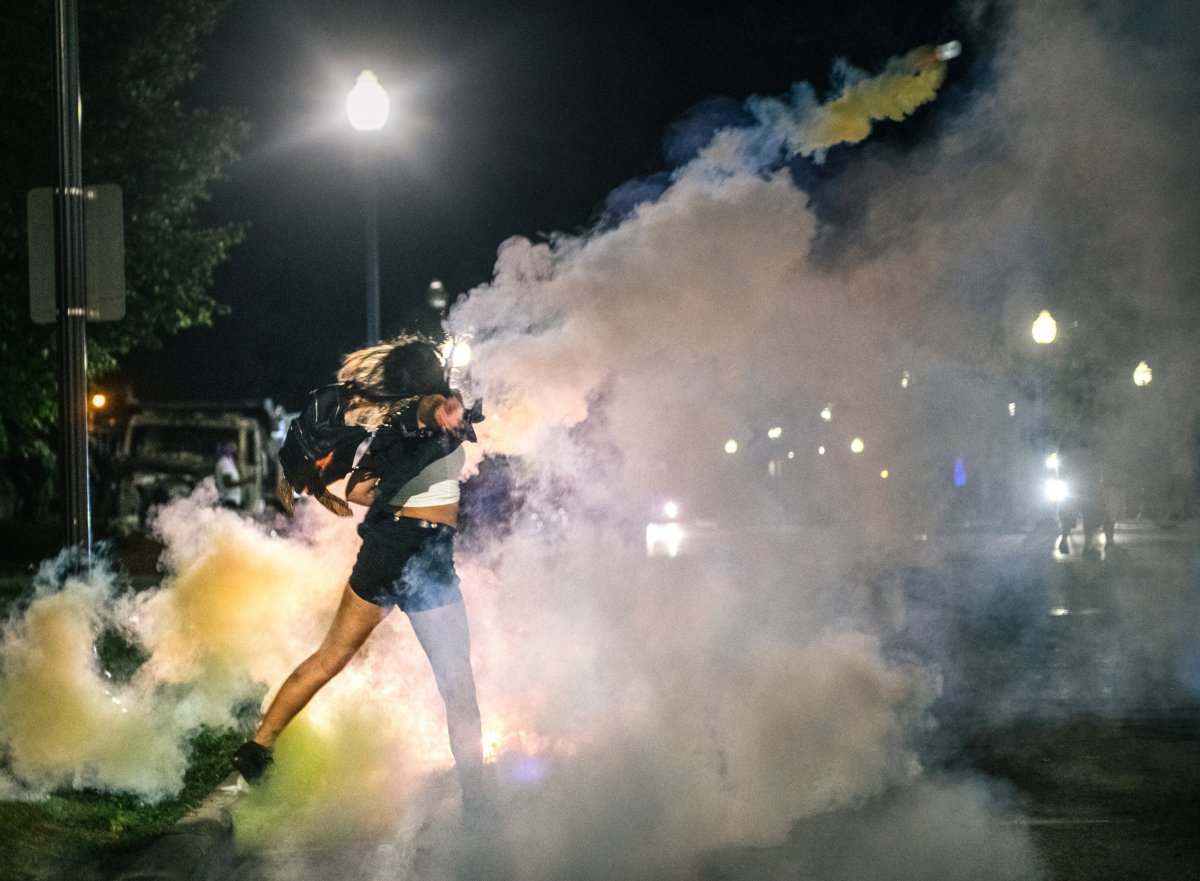Over the weekend, fires set by Black Lives Matter agitators in Kenosha, Wisconsin, engulfed the sign of the Bradford Community Church. It read, with not a little irony, "Black Lives Matter." It's hard to think of an image that captures the national moment better.
The trouble in the Badger State began on Sunday, August 23, after a confrontation between Kenosha police and Jacob Blake, a 29-year-old Black man, that ended with the latter shot. Court records show Blake has a pending criminal case that started last month. He was charged with third-degree sexual assault, trespassing and disorderly conduct in connection with domestic abuse. There was an active warrant for Blake's arrest at the time of the shooting. Footage of the incident shows Blake brawling with police, who unsuccessfully attempted to subdue him with a Taser. Blake breaks free, walks around an SUV tailed by a police officer ordering him to stop and then leans inside the vehicle before being shot by the officer.
Rioting followed almost immediately.
Protestors hurled projectiles, including Molotov cocktails and bricks, at police that night in Kenosha. One officer was knocked unconscious with a brick as he distanced himself from the flames protestors lit. As a SWAT vehicle attempted to maneuver through the city, protestors blocked the way, then opened fire on the armored car with rifles. Rioters ran roughshod through the night, setting fires, breaking into buildings and looting. Vehicles at a car dealership were vandalized and much of the lot was set ablaze. Whole buildings become effigies of mayhem, as protestors raved through the streets.
Come Monday, Kenosha looked like a war zone. Monday also happened to be the first day of the Republican National Convention (RNC), which put President Donald Trump and the GOP in the perfect position to denounce the violence and to assure Americans unequivocally of their stance athwart lawlessness. But that message did not come through.
On the first night of the convention, Donald Trump Jr. thundered about the victimization of decent people at the hands of violent agitators, then crossed his wires in the next sentence. "That's why we must put an end to racism, and we must ensure that any police officer who abuses their powers is held accountable," he said. Next came South Carolina Republican Senator Tim Scott, lauding the administration's First Step Act. "President Trump's criminal justice reform law fixed many of the disparities [Joe] Biden created and made our system more fair and just for all Americans," Scott said.
The problem with Trump Jr.'s seemingly anodyne phrasing is that putting "an end to racism" is the raison d'etre of the people now razing city blocks. As a popular concept for communicating ideas, "racism" is owned and defined by the people tormenting Kenosha. Hence, the notion that white Americans cannot experience racial prejudice because of their inherent privilege, regardless of their socioeconomic reality. Today's level of discourse is such that the term effectively has no objective meaning apart from its polemical, tendentious usage. By embracing, rather than rejecting it as entirely politicized, Republicans reinforce the framework at which they are tilting. On the other hand, soft-on-crime policies predicated on fighting "racism" hurt the very communities they claim to help. Consider the case of New York, which recently disbanded its plainclothes anti-crime police unit as part of the "putting an end to racism" project.

On June 2, New York City Police Chief Terrance Monahan told reporters that "just about all" those caught looting during recent riots—nearly a thousand—would be released due to the state's new bail reform law. The law eliminated cash bail for most misdemeanor and non-violent felony charges, including stalking, assault without serious injury, burglary, various drug offenses and even some kinds of arson and robbery. Advocates argued that even to consider this reform "dangerous" was to partake in racism. These ideas are more popular than people would like to think. Administration sources report that senior White House advisor Jared Kushner and Domestic Policy Council chief Brooke Rollins are exploring similar bail reform-type policies, at a federal level, for a second term.
By mid-June, under pressure from city lawmakers and officials, the NYPD disbanded its plainclothes unit. Before the month was over, gunshot injuries increased by 238 percent. By the end of July, the number of murders rose 59 percent over the same period last year. Among the killings were two teenagers shot at a Brooklyn park, a father shot while walking his six-year-old daughter in the Bronx, and a one-year-old shot in Bedford-Stuyvesant. Never mind that July 2020 Gallup survey data show 81 percent of African-Americans and 83 percent of Hispanic Americans want more or the same police presence in their communities. City officials rest easy knowing that they beat back the specter of bigotry, and White House staffers see an attractive model—even as Bed-Stuy bleeds.
Back in Kenosha, as Don Jr. and Senator Tim Scott acquiesced to the zeitgeist of reform, flames swallowed whole livelihoods. On Tuesday morning, Scott Carpenter and his mother Linda, owners of B&L Office Furniture, spoke to reporters amid the smoldering ruins of their shop. "I don't know what's next, what do we do next, other than clean up and I have some loose ends with some customers that we have going on," Scott said.
A few hours after Linda tearfully embraced her son while talking to reporters, the RNC's second day began with Norma Urrabazo, pastor of the International Church of Las Vegas, saying a prayer for Jacob Blake. The second day's focus was defending and building upon the administration's criminal justice reforms, with the promise of more to come. The First Step Act, the product primarily of Kushner, Rollins and White House staffer Ja'Ron Smith, took center stage as Trump pardoned a man convicted of robbing a bank. As the scratching of Trump's signature gave way to crackling flames in Wisconsin, there would be no mention of Kenosha's forgotten victims during the second night of the convention. The RNC went all-in on prison and police reform again.
"Things fall apart," wrote W. B. Yeats, when "the centre cannot hold." When Republican politicians offer nothing but empty and incoherent rhetoric, while Democrats seem to cheer on the madness, Americans have no leader to appeal to but the president himself. And yet Trump, too, appears reduced to mere rhetoric. If real leaders do not emerge soon, we will find ourselves living Yeats' lines, when the best all lack conviction, while the worst are full of passionate intensity: "Mere anarchy is loosed upon the world."
Pedro L. Gonzalez is assistant editor of American Greatness and a contributor at Chronicles: A Magazine of American Culture.
The views expressed in this article are the writer's own.
Uncommon Knowledge
Newsweek is committed to challenging conventional wisdom and finding connections in the search for common ground.
Newsweek is committed to challenging conventional wisdom and finding connections in the search for common ground.
About the writer
To read how Newsweek uses AI as a newsroom tool, Click here.






